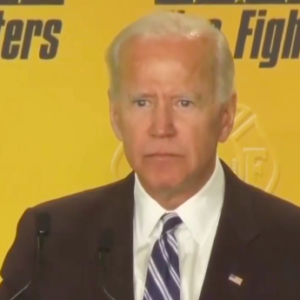When Joe Biden spoke warmly about his relationship with segregationist senators Herman Talmadge (D-GA) and James Eastland (D-MS), it raised questions for some about his sensitivity to issues of racial and social justice.
But for others it raised a more basic question: Just how old is Joe Biden?
The story broke Tuesday night as the former vice president attended a high-dollar fundraiser at the Carlyle Hotel in New York City– his third such event of the day. Speculating that he might be “too old-fashioned” for today’s Democratic Party, Biden recalled how the once-collegial U.S. Senate made it possible for people with profound ideological differences to work together.
“I was in a caucus with James O. Eastland,” Biden said. “He never called me ‘boy.’ He always called me ‘son.’”
And Sen. Talmadge was “one of the meanest guys I ever knew,” Biden said. “But at least there was some civility. We got things done.”
To most Americans–and Democratic primary voters in particular– the names Eastland and Talmadge mean nothing. These aren’t just politicians from a different century, they’re from a different America.
Sen. Eastland was a notorious racist and segregationist who helped lead the Democratic Party’s assault on civil rights legislation in the 1950s and ’60s. During WWII, Eastland argued from the Senate floor that black soldiers were unfit to serve. He also claimed that “boys from the South were fighting to maintain white supremacy.”
Talmadge, whose election as governor in 1948 was declared “the number one job of all Georgia Klansmen” by the local head of the KKK, spent years in the Senate fighting against civil rights legislation.
Younger voters are shocked. “How could Joe Biden work with men like this?” they ask. Because when you got elected to the Senate back in 1972, that was your job.
How long has Joe Biden been in politics?
— When Biden was first elected, eight of his 2020 opponents hadn’t been born yet. (Buttigieg, Castro, Gabbard, Messam, Moulton, Ryan, Swalwell and Yang.)
— His freshman class in the 93rd Congress included Jesse Helms (R-NC) and Howard Metzenbaum (D-OH).
— At least six of Biden’s Senate colleagues were born in the 1800s.
Joe Biden’s been in politics so long that one of his colleagues, Republican Sen. George Aiken of Vermont, was governor when his state sent 22 Civil War veterans to the Battle of Gettysburg reunion in 1938.
From the Civil War to AOC is quite a span. Can Joe Biden bridge that gap?
While it’s true that Sen. Bernie Sanders is older than Biden–and Sen. Elizabeth Warren’s 70th birthday is this Saturday, June 22nd– Biden’s age is more present in both his demeanor and his message. Even his supporters acknowledge Biden’s vocal cadence and appearance reflect his 77 years, and his habit of invoking names of friends and colleagues from the distant past doesn’t help.
Plus, Biden’s two core messages are fundamentally retro. The first is the “aberration” argument:
“I believe history will look back on four years of this president and all he embraces as an aberrant moment in time,” Biden says. “But if we give Donald Trump eight years in the White House, he will forever and fundamentally alter the character of this nation, and I cannot stand by and watch that happen.”
The second is the argument he tripped over Tuesday night, what Biden’s not-quite-contemporary President Warren G. Harding might call, “a return to normalcy:” Biden’s belief that American politics should go back to an era of bipartisan comity and cooperation.
Both arguments are appeals to nostalgia–“Make America Polite Again”– rather than invoking a vision of the future. And neither can be viewed as particularly progressive.
Today, Biden has a solid lead that, in the latest polls at least, is holding steady. But is a party whose base is made up of college kids, Millennials, progressive women and African-Americans really going to nominate a politician who debated the impeachment of President Nixon with his colleague Strom Thurmond to carry their banner in 2020?
Thurmond, by the way, ran for president himself–as a pro-segregation Dixiecrat in 1948. During the campaign, Thurmond famously said, “there’s not enough troops in the army to force the Southern people to break down segregation and admit the Negro race into our theaters, into our swimming pools, into our homes, and into our churches.”
When Thurmond died in 2003 after having served almost 50 years in the U.S. Senate, who spoke at his memorial service?



